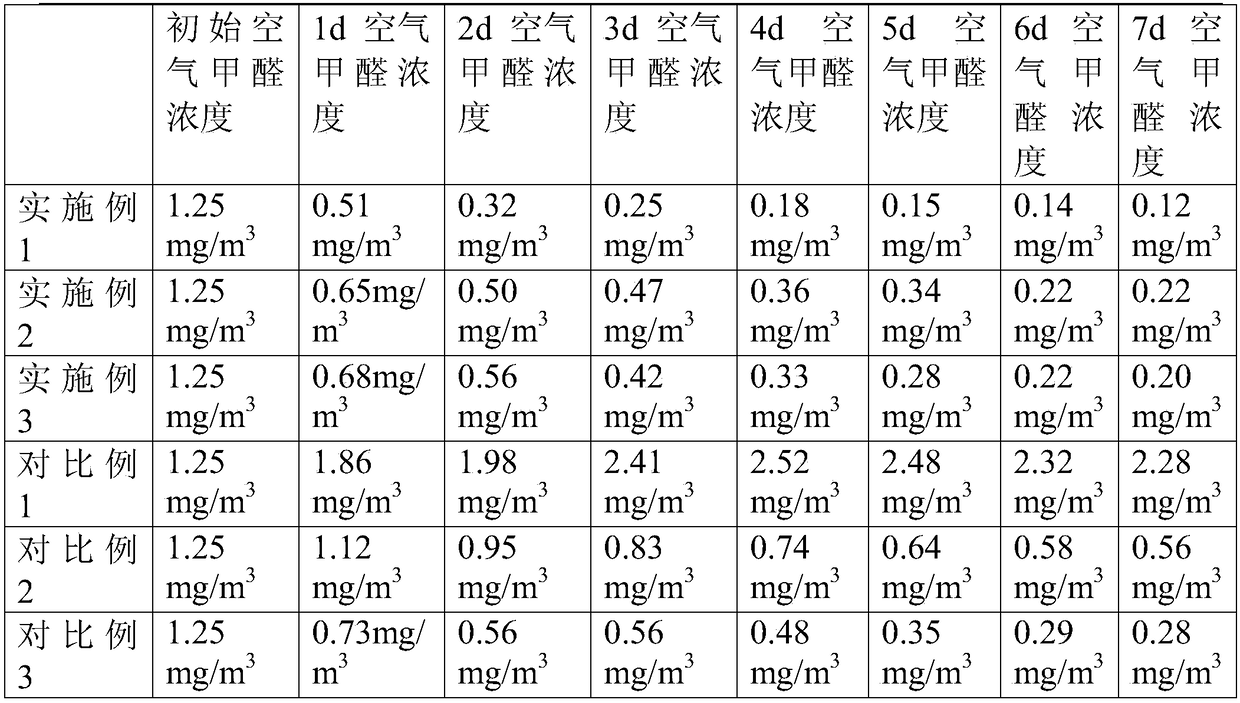High-adsorption carbon-plastic composite material manufacturing technology
A composite material with high adsorption technology, applied in the field of carbon-plastic composite materials, it can solve the problems of application limitation, poisoning, lack of adsorption or decomposition of formaldehyde, etc. The effect of sound insulation
- Summary
- Abstract
- Description
- Claims
- Application Information
AI Technical Summary
Problems solved by technology
Method used
Image
Examples
Embodiment 1
[0021] The manufacturing process of a kind of highly absorbing carbon-plastic composite material disclosed in embodiment 1 comprises the following preparation steps:
[0022] 1) According to the number of parts by mass, take 60 parts of bamboo charcoal particles with a particle size of 60 mesh, 2 parts of nano-titanium dioxide, and 1 part of a single-layer graphene oxide aqueous phase dispersion, stir at room temperature for 120 min, and vacuum dry at 95-100 °C for 12-20 min. After 24 hours, after calcination at a high temperature of 500-600°C, modified bamboo charcoal particles are obtained;
[0023] Wherein the preparation method of monolayer graphene oxide aqueous phase dispersion liquid is:
[0024] 60 parts by mass of graphene oxide, 20 parts of silane coupling agent and 4 parts of formaldehyde catalytic decomposition agent, wherein the formaldehyde catalytic decomposition agent is manganese acetylacetonate, and the silane coupling agent is diisopropoxylated bistrimethyl ...
Embodiment 2
[0028] A manufacturing process for a highly absorbent carbon-plastic composite material disclosed in Example 2 includes the following preparation steps:
[0029] 1) According to the number of parts by mass, take 40 parts of bamboo charcoal particles with a particle size of 60 mesh, 2 parts of nano-titanium dioxide, and 0.5 part of a single-layer graphene oxide aqueous phase dispersion, stir at room temperature for 120 min, and vacuum dry at 95-100 °C for 12-20 min. After 24 hours, after calcination at a high temperature of 500-600°C, modified bamboo charcoal particles are obtained;
[0030] Wherein the preparation method of monolayer graphene oxide aqueous phase dispersion liquid is:
[0031] 50 parts by mass of graphene oxide, 20 parts of silane coupling agent and 4 parts of formaldehyde catalytic decomposition agent, wherein the formaldehyde catalytic decomposition agent is manganese acetylacetonate, and the silane coupling agent is diisopropoxylated bistrimethyl Siloxylate...
Embodiment 3
[0035] A manufacturing process of a highly absorbent carbon-plastic composite material disclosed in Example 3 includes the following preparation steps:
[0036] 1) According to the number of parts by mass, take 40 parts of bamboo charcoal particles with a particle size of 60 mesh, 2 parts of nano-titanium dioxide, and 0.1 part of a single-layer graphene oxide aqueous phase dispersion, stir at room temperature for 120 min, and vacuum dry at 95-100 °C for 12-20 min. After 24 hours, after calcination at a high temperature of 500-600°C, modified bamboo charcoal particles are obtained;
[0037] Wherein the preparation method of monolayer graphene oxide aqueous phase dispersion liquid is:
[0038] 50 parts by mass of graphene oxide, 20 parts of silane coupling agent and 4 parts of formaldehyde catalytic decomposition agent, wherein the formaldehyde catalytic decomposition agent is manganese acetylacetonate, and the silane coupling agent is diisopropoxylated bistrimethyl Siloxylated...
PUM
| Property | Measurement | Unit |
|---|---|---|
| particle size (mesh) | aaaaa | aaaaa |
| particle size (mesh) | aaaaa | aaaaa |
Abstract
Description
Claims
Application Information
 Login to View More
Login to View More - R&D
- Intellectual Property
- Life Sciences
- Materials
- Tech Scout
- Unparalleled Data Quality
- Higher Quality Content
- 60% Fewer Hallucinations
Browse by: Latest US Patents, China's latest patents, Technical Efficacy Thesaurus, Application Domain, Technology Topic, Popular Technical Reports.
© 2025 PatSnap. All rights reserved.Legal|Privacy policy|Modern Slavery Act Transparency Statement|Sitemap|About US| Contact US: help@patsnap.com

